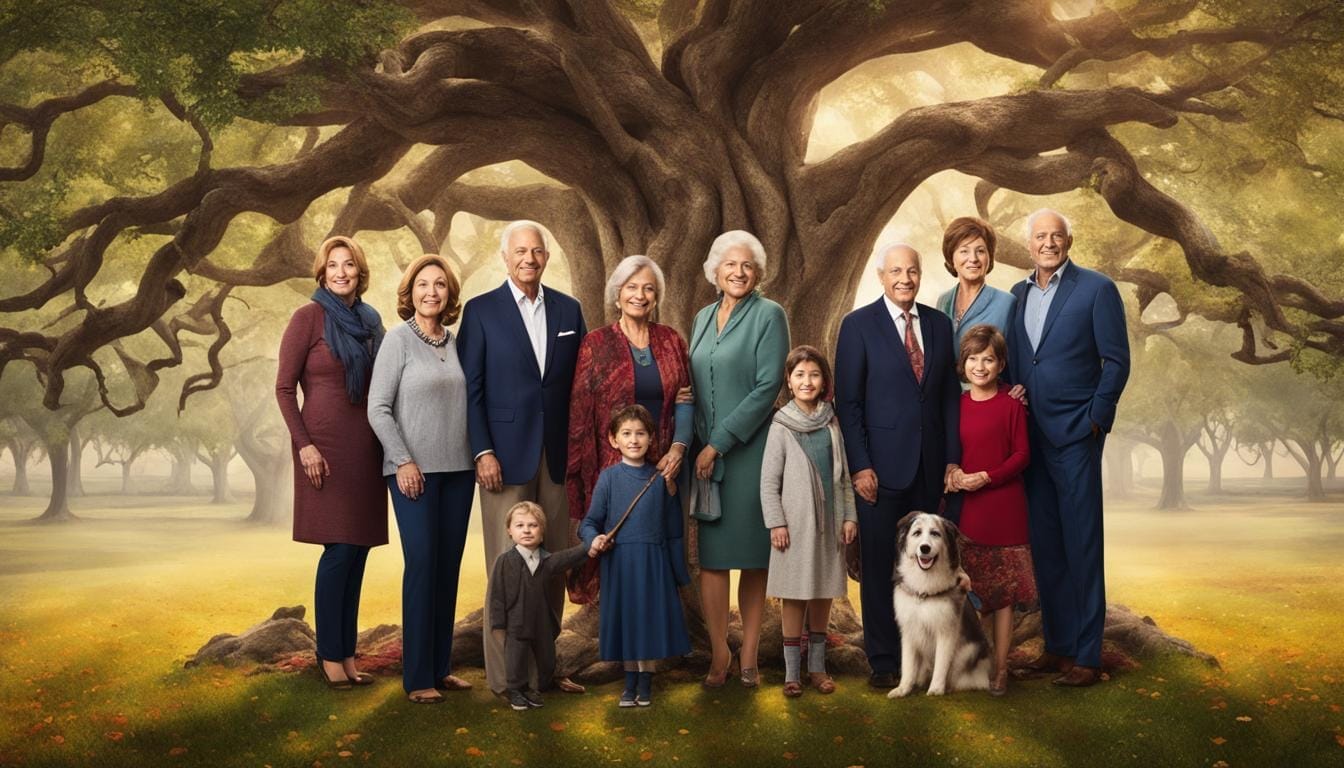Have you ever wondered about the meaning of “in law” in the context of family relationships? In this article, we will explore the definition and significance of in law family. So, what does in law mean family exactly?
In law family refers to the relatives by marriage, such as the mother or father of a person’s spouse. It signifies the extended family members beyond blood ties and includes the relationships formed through marriage. These family members play an important role in our lives and contribute to our overall family experience.
Now that we have defined in law family, let’s dive deeper into the details of what it means and the relationships that fall under this category.
The Definition of In Law Family
In law family members are those who are related to a person by marriage. This includes the mother or father of one’s spouse, as well as siblings-in-law, and other relatives by marriage. The term “in law” indicates the legal bond created through marriage.
In law family relationships expand the concept of a traditional family, encompassing both blood ties and the connections formed through marriage. Understanding the definition of in law family is essential in recognizing the significance of these relationships in the broader family structure.
When two individuals enter into a marital union, they not only join their lives but also merge their families. For example, when John and Sarah get married, John’s parents become Sarah’s in-laws. Sarah’s siblings, on the other hand, become John’s siblings-in-law. This extension of family through marriage is what defines an in law family.
Furthermore, in law family members play vital roles in a person’s life, providing emotional support, companionship, and an expanded network of relationships. In law family can offer a sense of belonging and contribute to a person’s overall family experience.
Types of In Law Family Relationships
In law family relationships come in various forms, each with its unique dynamics and contributions. Let’s explore some common types of in law family relationships:
- Mother or Father-in-law: The parents of one’s spouse.
- Brother or Sister-in-law: The siblings of one’s spouse.
- Son or Daughter-in-law: The spouse of one’s child.
- Extended Relatives: Other family members related by marriage, such as aunt-in-law, uncle-in-law, and cousin-in-law.
These relationships are formed through the legal bond of marriage and hold significance within the family structure. Navigating these relationships requires understanding, respect, and open communication.
By recognizing the definition and importance of in law family, individuals can foster stronger connections and create a supportive and inclusive family environment.
In Law Family Relationships
In law family relationships are an important aspect of family dynamics, shaping the connections and bonds formed through marriage. These relationships vary depending on the specific family dynamics, but they contribute to the overall fabric of the family. Understanding the meaning of in law in a family context is crucial for navigating these relationships.
Common in law family relationships include:
- Mother or father-in-law: The parents of one’s spouse. They play a significant role in providing support, guidance, and often serve as trusted mentors.
- Brother or sister-in-law: The siblings of one’s spouse. These relationships can offer companionship, shared experiences, and the potential for lifelong friendships.
- Son or daughter-in-law: The spouse of one’s child. These relationships signify the expansion of the family and often involve the blending of traditions and celebrations.
Each of these relationships comes with its own unique dynamics and expectations. In law family members become an integral part of a person’s support network and contribute to the overall familial experience. They provide emotional support, practical assistance, and can become lifelong confidants.
It is important to note that in law family relationships have legal implications as well. For instance, they may have a role in decision-making processes, inheritance matters, and legal responsibilities.
The Importance of In Law Family
In law family members play a vital role in a person’s life by providing emotional support, companionship, and a sense of belonging. The relationships formed through marriage contribute greatly to a person’s overall family experience and help create a strong support system. Understanding the significance of in law family is essential for fostering healthy and fulfilling connections within the extended family unit.
The Value of Support
One of the key benefits of in law family is the support system it provides. In law family members can offer guidance, advice, and a listening ear during both joyful and challenging times. They are there to celebrate achievements, offer comfort during hardships, and provide a sense of reassurance that one is not alone. This support network is crucial for emotional well-being and personal growth.
Creating Lasting Bonds
In law family relationships have the potential to develop into deep and lasting bonds. By spending time together, sharing experiences, and creating cherished memories, these relationships strengthen over time. This sense of connection extends beyond immediate family members and reinforces the concept of a unified and loving family unit.
Diverse Perspectives and Experiences
In law family members bring a unique blend of perspectives, experiences, and traditions into the family dynamic. This diversity enriches the overall family culture, broadens horizons, and fosters understanding and acceptance of different backgrounds. Learning from one another’s customs and traditions can create a more inclusive and harmonious family environment.
The Role of In Law Family in Nurturing Relationships
In law family plays a significant role in nurturing relationships within the larger family unit. They contribute to the strengthening of bonds between spouses, parents, siblings, and children. In law family members act as bridges between different branches of the family tree and help create harmony, unity, and a sense of belonging for everyone involved.
| Benefits of In Law Family | Challenges of In Law Family |
|---|---|
|
|
Cultural Perspectives on In Law Family
In different cultures, the concept of in law family can vary significantly, shaping the dynamics and relationships within families. These cultural perspectives offer valuable insights into the role and significance of in law family and how it is perceived in different societies.
Marriage Traditions and In Law Family
Marriage traditions play a crucial role in defining the significance of in law family in various cultures. For example, in some cultures, such as India, the concept of in law family holds immense importance. The bride is expected to move in with the groom’s family and play a vital role in maintaining familial harmony.
On the other hand, in Western cultures, such as the United States, the focus is more on the couple and their individual nuclear families. While relationships with in laws are valued, the level of involvement and integration within the extended family may differ from other cultures.
In Law Family in Different Cultures
Let’s explore how in law family is perceived and understood in some diverse cultures:
- Chinese Culture: In China, in law family is an essential part of the social structure. The patriarchal structure places a strong emphasis on filial piety, where the wife is expected to prioritize her husband’s family and fulfill her role as a daughter-in-law.
- Latin American Culture: In Latin American countries, family plays a central role. In law family relationships are highly valued, and extended families often live close to each other, fostering a strong sense of community and support.
- Middle Eastern Culture: In Middle Eastern cultures, in law family relationships are significant, with strong bonds and obligations between in laws. The extended family plays a central role in social and familial matters.
- Native American Culture: Native American cultures take a communal approach, where the entire community is considered a family. In law family relationships extend beyond blood ties, emphasizing unity and cooperation.
The Role of Cultural Perspectives
Understanding cultural perspectives on in law family is crucial for appreciating the diversity and complexity of these relationships worldwide. It allows us to recognize the significance placed on in law family in different cultures and appreciate the traditions and customs that shape these connections.
| Culture | Perception of In Law Family |
|---|---|
| Chinese | High value, importance of filial piety and daughter-in-law role |
| Latin American | Strong emphasis on extended family support and community |
| Middle Eastern | Significant role, strong bonds, and obligations between in laws |
| Native American | Communal approach, unity, and cooperation beyond blood ties |
These cultural perspectives shape expectations, obligations, and dynamics within in law family relationships. By understanding and respecting these cultural differences, we can foster stronger connections and appreciation for the diverse tapestry of family life around the world.
Challenges and Benefits of In Law Family
Like any family relationships, in law family can present both challenges and benefits. Navigating these relationships may require open communication, understanding, and patience. However, in law family can also provide a sense of connection, additional support, and the opportunity to create lasting bonds.
One of the main challenges of in law family is navigating different expectations and dynamics. Each family has its own unique set of traditions, beliefs, and values, which can sometimes lead to misunderstandings or conflicts. It is important to approach these challenges with empathy and a willingness to find common ground.
Another challenge is balancing the relationships within the in law family with those in one’s immediate family. This can be particularly difficult during holidays or special occasions when multiple family gatherings are happening simultaneously. It is crucial to communicate openly and find ways to maintain healthy connections with all family members.
Despite these challenges, there are also numerous benefits to having an in law family. For one, it expands one’s support system and provides an additional network of people who care and can offer guidance. In law family members can also become cherished friends and confidants.
Moreover, in law family can bring a sense of cultural richness and diversity to one’s life. Different traditions, customs, and perspectives can greatly enhance the overall family experience and foster a deeper understanding and appreciation of different cultures.
Navigating in law relationships requires open-mindedness and a willingness to adapt. Here are some tips to foster positive relationships:
- Practice active listening and empathy
- Respect and honor each other’s boundaries
- Communicate openly and honestly
- Celebrate and embrace cultural differences
- Support and uplift one another
Benefits of In Law Family
Having an in law family comes with numerous benefits. Firstly, it provides a broader sense of community and belonging. In law family members can offer support, guidance, and a sense of kinship.
Secondly, in law family relationships can bring diverse perspectives and strengths to the table. Different backgrounds and experiences can lead to unique problem-solving approaches and foster personal growth.
Lastly, in law family can create lasting bonds and lifelong connections. As individuals navigate through life’s challenges, having a strong support system can be invaluable.
Overall, while there may be challenges in maintaining strong in law family relationships, the benefits of having this extended network of support and connection far outweigh the difficulties. With open communication, understanding, and patience, navigating in law relationships can lead to meaningful and lifelong connections.
| Challenges of In Law Family | Benefits of In Law Family |
|---|---|
| Navigating different expectations and dynamics | Expands support system |
| Managing relationships within immediate and in law families | Brings cultural richness and diversity |
| Balance of time and attention | Fosters personal growth |
Conclusion
In law family is an integral part of family dynamics, representing the relationships formed through marriage. These extended family members, such as the mother or father of a person’s spouse, play a vital role in providing support, companionship, and a sense of belonging. Understanding the meaning and significance of in law family can help foster strong connections and contribute to a positive family experience.
Despite the challenges that may arise, navigating in law family relationships with open communication, understanding, and patience can lead to valuable support and the opportunity to create lasting bonds. In law family members create an additional layer of support and enrichment to the overall family structure.
Whether it’s the mother-in-law offering advice and guidance or the sister-in-law becoming a close friend, in law family can bring unique perspectives and diverse experiences into a person’s life. Embracing these relationships and recognizing their importance can lead to a more connected and fulfilling family life.













